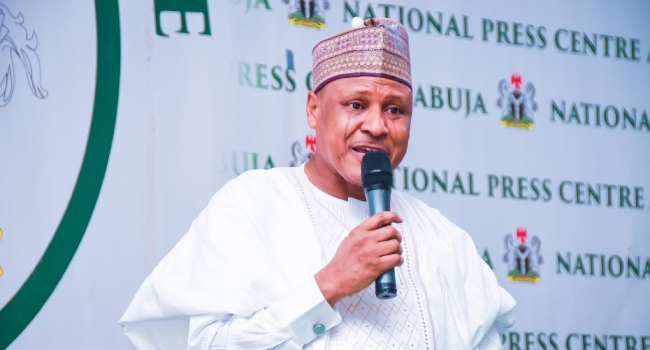The Samoa Agreement signed by Nigeria at the Organisation of African, Caribbean and Pacific States (OACPS) Secretariat in Brussels, Belgium is in the country’s interest, the Federal Government has said.
Information and National Orientation Minister Mohammed Idris, who clarified Nigeria’s stand, said the agreement is about sustainable economic growth and development and other beneficial protocols.
The minister’s clarification came against the backdrop of the controversy generated by the pact.
Idris said Nigeria made it clear that any provision that is inconsistent with the laws of Nigeria shall be invalid, by ensuring that none of the 103 Articles and Provisions of the Agreement contravenes the 1999 Constitution as amended, or laws of Nigeria and other extant laws.
The minister clarified that the administration of President Bola Ahmed Tinubu will not sign any agreement that is detrimental to the interest of the country.
According to him, the government upholds the existing legislation enacted in 2014 against same sex relationship in Nigeria.
The agreement, signed on June 28 by the OACPS and the European Union (EU) for areas of cooperation among signatories, allegedly contained a clause requesting the signatories to support Lesbian, Gay, Bisexual, and Transgender (LGBT) community as condition for getting financial and other supports from advanced societies.
But the Government said the LGBT clause was not binding because it is against the 1999 Constitution and the laws of the country.
The minister said the government was part of the agreement only for economic development, the promotion of democracy and human rights, among others.
He said the negotiations of the agreement started in 2018 on the sidelines of the 73rd United Nations General Assembly (UNGA).
He said: “On June 28, 2024, Nigeria signed the Samoa Agreement at the Organisation of African, Caribbean, and Pacific States (OACPS) Secretariat in Brussels, Belgium.
“The partnership agreement is between the EU and its Member States, on one hand, and the members of the OACPS on the other.
“Negotiations on the agreement started in 2018, on the sidelines of the 73rd UNGA. It was signed in Apia, Samoa on the 15th of November 2018 by all 27 EU Member states and 47 of the 79 OACPS Member states.
“The agreement has 103 articles comprising a common foundational compact and three regional protocols, namely: Africa – EU; Caribbean-EU, and Pacific-EU Regional Protocols with each regional protocol addressing the peculiar issues of the regions.”
Giving insights into the African Regional Protocol of the Samoa Agreement, he added: “The African Regional Protocol consists of two parts. The first is the Framework for Cooperation, while the second deals with Areas of Cooperation, containing Inclusive and sustainable economic growth and development; human and social development; environment, natural resources management, and climate change; peace and security; human rights, democracy and governance; and migration and mobility.
“Nigeria signed the Agreement on 28 June 2024. This was done after the extensive reviews and consultations by the inter-ministerial committee, convened by the Federal Ministry of Budget and Economic Planning (FMBEP) in collaboration with the Ministry of Foreign Affairs (MFA) and Federal Ministry of Justice (FMOJ).”
The minister said the government ensured that none of the provisions of the agreement contravenes the 1999 Constitution as amended or laws of Nigeria, and other extant laws.
He added: “It was ensured that none of the 103 Articles and Provisions of the Agreement contravenes the 1999 Constitution as amended or laws of Nigeria, and other extant laws. In addition, Nigeria’s endorsement was accompanied by a Statement of Declaration, dated 26th June 2024, clarifying its understanding and context of the Agreement within its jurisdiction to the effect that any provision that is inconsistent with the laws of Nigeria shall be invalid.

